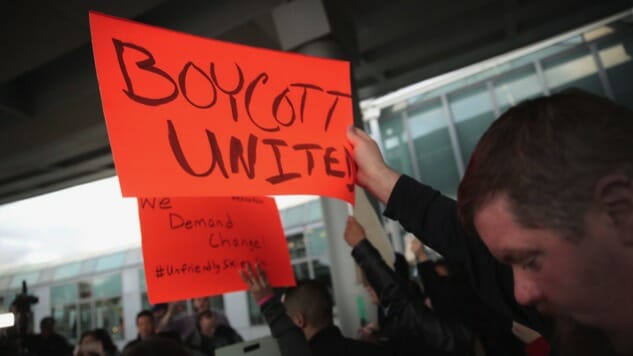“No Angel”: How Racial Stereotypes and Privilege Explain the United Airlines Fallout
Photo by Scott Olson
By now, let me assume you’ve seen the video of the United Airlines flight where a passenger, a doctor who had to see patients the next day, wouldn’t give up his paid seat to some United employees, and ended up getting his head bashed by three security officers who then dragged his senseless, prone body out of the plane—you can’t watch this video without a visceral reaction: shaking, blood pressure spiking. Is this real?
Seeing that the man was Asian added another “of course!” layer to the horror. Many of us saw our doctor dads and moms.
They’re going to have to find a way to “justify” this, I thought to myself, and I sat back and waited for the stereotypes of the creepy Asian male to come out—stereotypes I outlined in more detail in this article in Quartz—perverted, unreasonable, loud, bumbling. In just a few hours following the incident, the Chicago police indeed sent out a news release describing how a “69-year-old male Asian airline passenger” became “irate” aboard the flight and that officers “attempted to carry the individual off the flight when he fell.” The New York Daily News described him as a “man claiming to be a doctor.” The CEO of United apologized to the company, but not to the man, disparaging him as “disruptive and belligerent.”
Our Darwinian capitalist system shockingly makes it completely legal for a corporation (that’s already been bailed out with taxpayer money) to maximize their capacity while disadvantaging the consumer with overbooking (yet, as a consumer, you are not allowed to game the system by, say, making multiple reservations). In this case, the plane had been boarded, everyone seated, but then United decided to kick out four paying customers, and then called in the police state to demand compliance when the doctor, who has now been identified as David Dao, objected. This is some real Hunger Games stuff right here.
But when our corporate police state maims or kills people of color, the machinery immediately began to grind out to narratives to divert our gaze. Sure, Michael Brown was shot in cold blood and his body was left out in the open for hours—but (look over here!), somebody said he’s no angel! Philando Castile, a school cafeteria worker who memorized all the allergies of his 500 students, was previously stopped by the police multiple times, he must have done something to deserve being shot. Twelve-year-old Tamir Rice had a gun. Well, a toy gun, but a gun! No angel! Trayvon Martin looked scary, therefore George Zimmerman needed to shoot him. Eric Garner may have been selling “loosie” cigarettes and therefore needed to be choked to death. No angel!
Less than twenty four hours after the United debacle, the wheels of the media were busily No Angel-ing the Asian doctor. By mid-morning (possibly with United’s help behind the scenes), there was a TMZ piece about the doctor’s “troubled past.” By noon, most of the major news outlets were running a “troubled past” story—yet none of them ran through the motions of journalism 101 by talking to the doctor himself. The New York Post, which normally comes up with funny headlines, just went straight for the creepy Asian man stereotype: “Doctor Dragged off Flight Was Convicted of Trading Drugs for Sex.”
It’s tiring for us people of color to be told (as I have been), so soothingly, to calm down, that this beatdown of the Asian doctor was not about race. That’s because they don’t have to experience the inchoate rage of being stopped first, second, and third of your three flights for a random “extra” screening, for which I did blurt, not unlike Dr. Dao, “You’re doing this because I’m Asian, aren’t you?” Or watching my elderly aunt and uncle visiting from Korea during the height of the “Axis of Evil” furor go through similar extra screening, the poking and the prodding, the impatience with them for not speaking English, and my aunt was so traumatized she reportedly vomited throughout the flight back to Seoul.
White people, especially white men, have trouble—or don’t bother seeing—their privilege, because it’s something you only miss if it’s not there. It’s a little like the conundrum of teaching my son, who has autism, the meaning of “quiet” when I have to make noise to explain it to him. It’s much harder to explain an absence, even harder to understand it if you haven’t experienced it (and thus ten times more irritating for the person of color to have to listen to a lecture from someone who has no idea what they are talking about).
I unfortunately can’t run a double-blind, evidenced based experiment showing precisely the different way a white man would have been treated, but I’ve come up with an example that’s pretty close.
Imagine a kindly gentleman, age 75, in the same age range as Dr. Dao (69). This nice man is also a doctor (a dermatologist), a good Christian and the now former governor of Alabama. Imagine Robert Bentley:
-

-

-

-

-

-

-

-

-

-

-

-

-

-

-

-

-

-

-

-

-

-

-

-

-

-

-

-

-

-

-

-

-

-

-

-

-

-

-

-









































